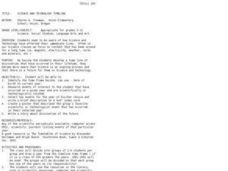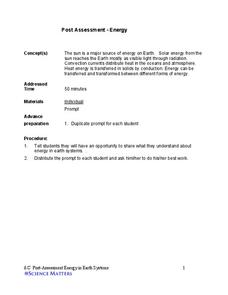Curated OER
Integrating Space Science-Ion Propulsion in Deep Space I
In this ion propulsion learning exercise, students read about Deep Space I that uses ion propulsion to power the spacecraft. They learn about ion propulsion and answer three questions about it.
Curated OER
Science and Technology Timeline
Young scholars develop a time line of discoveries that have occurred in their lifetime. In this time line lesson plan, students research scientifically or technologically related events of interest to them, write a brief description on a...
Curated OER
Science Hits Activity
Students listen to a song that teaches the elements of the periodic table and write their own song to be used as an aid in remembering scientific information.
Curated OER
Science:Effects of Weathering
Seventh graders take an outdoor observation walk around the campus and take soil samples. Working in groups , they conduct experiments with rocks and soil that demonstrate the effects of different types of erosion.
Curated OER
Systems of Equations in Space Science
In this system of equations worksheet, high schoolers solve 2 problems by creating a system of equations for each problem in order to determine the average intensity of flares from the sun and the average power from a satellite transponder.
Curated OER
Science: Einstein's Big Idea
Students explore the various aspects of Einstein's energy equation and discover how energy is transferred from one form to another. In teams, they rotate through seven stations to experience such aspects of energy change through...
Curated OER
Applied Science - Technology (5A) Lab
Fifth graders explore electromagnetic waves and light. In this light lesson plan, 5th graders draw the parts of a wave of the electromagnetic spectrum. They compare a flashlight to a laser to see how the light looks when shined through...
Curated OER
Can You See the Light?
Third and fourth graders use this worksheet to help them draw their own version of a fully functioning circuit. They see the battery, the light bulb, and two wires with clips. They must draw the complete circuit, using these elements, on...
LABScI
Circuits Lab: Lightbulbs
Electrons flow from negative to positive, but the general consensus is that current flows from positive to negative. Scholars explore current through construction of circuits in both series and parallel. The focus is on voltage,...
Curated OER
Energy
Wow! Colorful and simple, these 160 slides introduce the various forms of energy, along with a relevant image. Some of the images are animations, which help beginning physical scientists to visualize the flow of electrons or energy! This...
Urbana School District
Magnetism
The compass was first used in 206 B.C., but we didn't discover magnetic poles until 1263 A.D. Presentation begins with the history of magnetism before continuing on to magnetic fields, magnetic forces, electromagnets, currents,...
It's About Time
AC and DC Currents
An informative physics lesson includes two teacher demonstrations, one on AC currents and the other on DC currents, allowing pupils to take notes while watching. The resource includes questions to assign as homework or...
Energy for Keeps
Renewable Energy Action Project: What's in Your Energy Portfolio?
Uncover the renewable energy potential in your region. The activity outlines an approach to research current practices and trends. Learners conduct surveys to assess the attitudes of the local population and prepare a paper summarizing...
Bowels Physics
Electrostatics
Explore behavior of particles that cannot be seen with a detailed PowerPoint presentation that outlines the basics of electrostatics. The presentation addresses the charge of subatomic particles, conductors and insulators,...
Science Matters
Post-Assessment Energy
After nine lessons and activities about energy, here is the final assessment. The 20-questions include multiple choice, multiple choice with justification, short answer, answer analysis, and labeling diagrams to challenge learners.
NOAA
Oceans of Energy
Are the earth's oceans really just giant batteries, waiting for their energy to be harnessed? Middle school mechanical engineers will be shocked by the amazing amount of energy that forms around them after diving into part four of a...
PBS
Hidden Alarm
It's time! The fourth lesson in a five-part series has teams of scholars build a circuit for an alarm. A switch lets them turn the alarm on and off and allows them to hide the alarm—just as long as they don't hide it in the classroom!
Teach Engineering
Efficiency of a Water Heating System
Tired of waiting for hot water? Groups of three determine the efficiency of an electric water-heating device. They calculate the amount of energy it takes to heat the water and the theoretical amount of energy required to heat the water....
Bonneville
Biolite - Fire to Phone Charging
Provide the spark to foster a love of science. Instructors perform a demonstration that uses a camping stove to generate electricity to charge a phone. Pupils use data from the experiment to the calculate the efficiency of the stove....
CK-12 Foundation
Telegraph
Most pupils don't know what a telegraph is, much less how one works. A secret simulation has scholars pick the size of the primary and secondary loops, the battery voltage, and which letters in the Morse Code they want to transmit. They...
It's About Time
Force Fields
Young scholars investigate both bar and horseshoe magnets. They explore force fields with a compass and iron fillings before making an electromagnet. This is the first in a series of nine lessons.
It's About Time
Exploring Energy Resource Concepts
Please turn off the lights to conserve energy. Or not, after all energy is always conserved. This first lesson in an eight-part series includes three parts. Part A contains one hands-on activity and two inquiry-based experiments on heat...
Columbus City Schools
Transformation: Energy in Disguise
Energy transformations happen everywhere, every second of the day. The energy transformation common to most scholars is potential and kinetic energy. The three-week lesson covers multiple types of energy transformations through...
National Nanotechnology Infrastructure Network
Small Scale Stenciling: Mask Lab
Investigate the procedure for developing computer chips! Learners use solar print paper to create both positive and negative images. They observe the effects of single and multiple exposures and compare results.
Other popular searches
- Science Electricity Year 2
- Physical Science Electricity
- Science Electricity Switches
- Primary Science Electricity
- Science Electricity Terms
- Life Science Electricity
- Science Electricity Wind
- Science Electricity English
- Science Electricity Lessons
- Science Electricity Internet
- 5th Science Electricity
- Pe Science Electricity

























